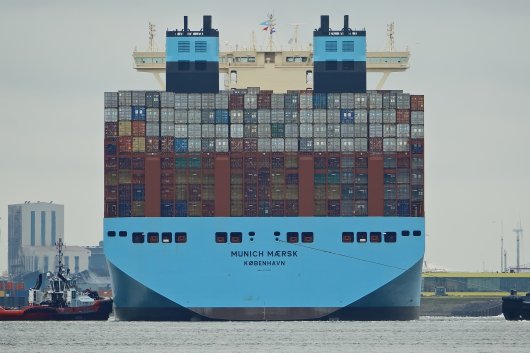Maersk spent $476m less on bunkers in 2019
Fuel consumption and average price fell by 6.7% and 2.8%, respectively.
A.P. Moller - Maersk reports that its Ocean segment spent $476m less on bunker fuel in 2019 compared to the previous year.
The boxship operator's total annual spend on marine fuels declined by 9.4 percent to $4.566bn last year, down from $5.042bn in 2018.
The average bunker price paid by Ocean in 2019 was $412 per tonne - a drop of $12, or 2.8 percent, on the $424-per-tonne figure recorded in 2018, which was the highest annual average price since 2014.
In terms of bunker consumption, Ocean purchased 11.092m tonnes of marine fuel last year, representing a year-on-year (YoY) decrease of 802,000 tonnes, or 6.7 percent.
Quarterly breakdown, bunker fuel
Maersk average bunker price, 2015-2019
Key financial results for 2019
In its financial results for the year, Ocean reported operating earnings (EBITDA) of $4.356bn, which was a YoY improvement of $574m, or 15.2 percent.
Revenue during the 12-month period rose by 52m, or 0.2 percent, to $28.418bn.
As regards overall group performance, A.P. Moller - Maersk posted a net underlying profit of $546m - a rise of $607m on the previous year's result.
EBITDA grew YoY by $715m, or 14.3 percent to $5.712bn, whilst revenue dipped $367m, or 0.9 percent, to $38.89bn
Guidance for 2020
In its guidance for 2019, Maersk said a $100 change in the price of bunker fuel would lead to the group's EBITDA varying by $0.4bn.
The boxship operator's total annual spend on marine fuels declined by 9.4 percent to $4.566bn last year, down from $5.042bn in 2018.
The average bunker price paid by Ocean in 2019 was $412 per tonne - a drop of $12, or 2.8 percent, on the $424-per-tonne figure recorded in 2018, which was the highest annual average price since 2014.
In terms of bunker consumption, Ocean purchased 11.092m tonnes of marine fuel last year, representing a year-on-year (YoY) decrease of 802,000 tonnes, or 6.7 percent.
Quarterly breakdown, bunker fuel
| Q1 | Q2 | Q3 | Q4 | |
| Consumption (MMT) | 2.739 | 2.777 | 2.803 | 2.773 |
| Cost ($bn) | 1.142 | 1.210 | 1.118 | 1.096 |
| Avg Price ($/mt) | 417 | 436 | 399 | 395 |
Maersk average bunker price, 2015-2019
| Year | Price($/mt) | +/-($) | +/-(%) |
| 2019 | 412 | -12 | -2.8 |
| 2018 | 424 | +103 | +32.1 |
| 2017 | 321 | +98 | +43.9 |
| 2016 | 223 | -92 | -29.2 |
| 2015 | 315 | -247 | -44.0 |
Key financial results for 2019
In its financial results for the year, Ocean reported operating earnings (EBITDA) of $4.356bn, which was a YoY improvement of $574m, or 15.2 percent.
Revenue during the 12-month period rose by 52m, or 0.2 percent, to $28.418bn.
As regards overall group performance, A.P. Moller - Maersk posted a net underlying profit of $546m - a rise of $607m on the previous year's result.
EBITDA grew YoY by $715m, or 14.3 percent to $5.712bn, whilst revenue dipped $367m, or 0.9 percent, to $38.89bn
Guidance for 2020
In its guidance for 2019, Maersk said a $100 change in the price of bunker fuel would lead to the group's EBITDA varying by $0.4bn.

|
Swedish biomethane bunkered in Gothenburg
Test delivery performed by St1 and St1 Biokraft, who aim to become large-scale suppliers. |
|
|
|
||

|
Cockett to be closed down after 45 years
End of an era as shareholders make decision based on 'non-core nature' of Cockett's business. |
|
|
|
||

|
Petrobras confirms prompt availability of VLS B24 at Rio Grande
Lead time for barge deliveries currently five days. |
|
|
|
||

|
IMO approves pricing mechanism based on GHG intensity thresholds
Charges to be levied on ships that do not meet yearly GHG fuel intensity reduction targets. |
|
|
|
||

|
VARO Energy expands renewable portfolio with Preem acquisition
All-cash transaction expected to complete in the latter half of 2025. |
|
|
|
||

|
NYK trials biofuel in milestone coal carrier test
Vessel is used to test biofuel for domestic utility company. |
|
|
|
||

|
H-Line Shipping orders LNG bunkering vessel
Vessel with 18,000-cbm capacity to run on both LNG and MDO. |
|
|
|
||

|
How to engineer and manage green shipping fuels | Stanley George, VPS
Effective management strategies and insights for evolving fuel use. |
|
|
|
||

|
Swedish government bans scrubber wastewater discharges
Discharges from open-loop scrubbers to be prohibited in Swedish waters from July 2025. |
|
|
|
||

|
MAN Energy Solutions achieves 100% load milestone for ammonia engine
Latest tests validate fuel injection system throughout the entire load curve. |
|
|
|
||
Related Links
- · Maersk posts higher average bunker price, lower consumption [Insights]
- · Maersk posts decline in bunker consumption, costs [Insights]

